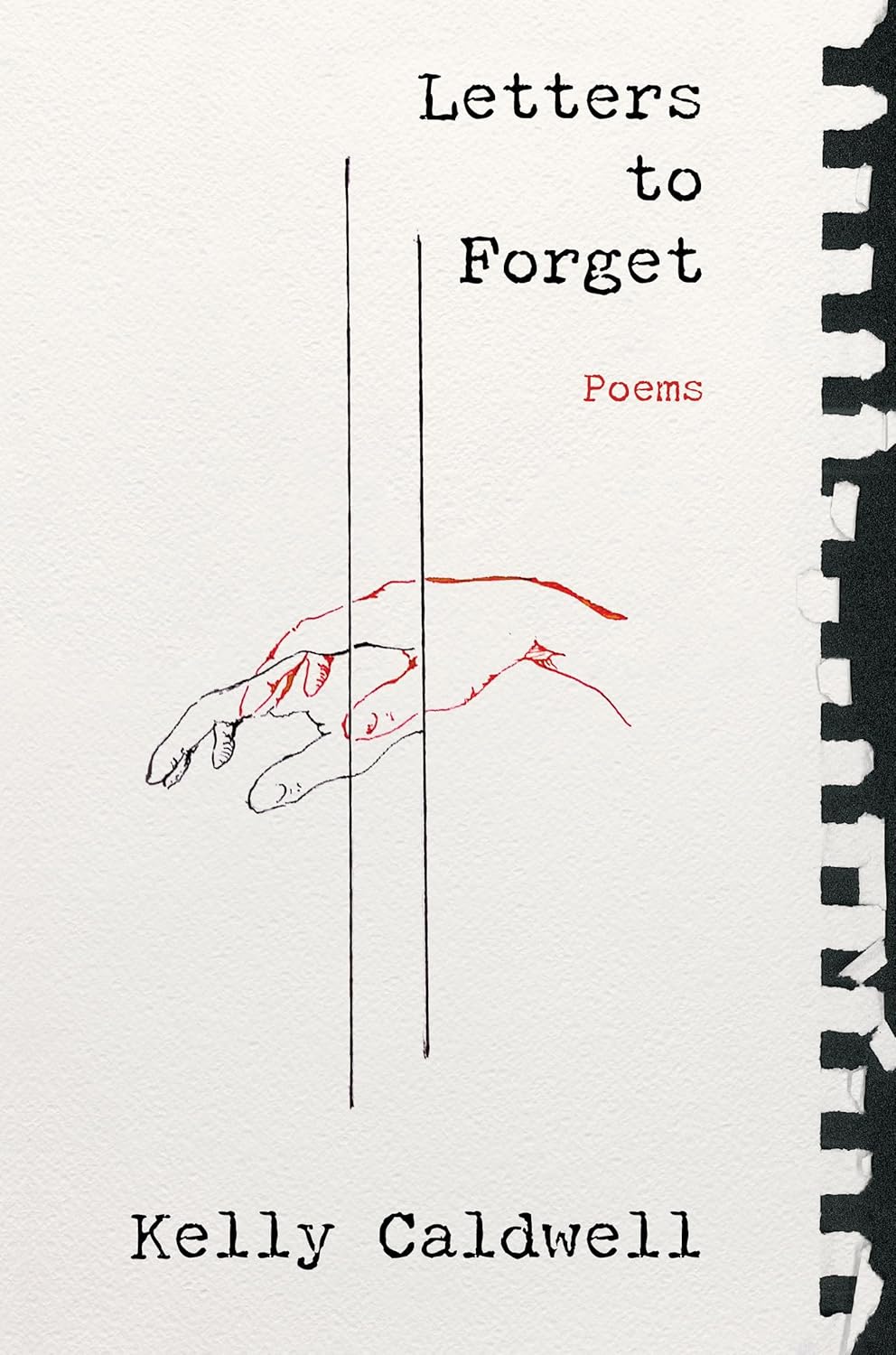Review of Letters to Forget: Poems by Kelly Caldwell

Letters to Forget: Poems
Kelly Caldwell
Knopf, 2024, 112 pages
$24.00
Reviewed by Lya Hennel
I previously reviewed Your Dazzling Death by Cass Donish, a beautiful poetry collection and elegy to the author’s partner, Kelly Caldwell. Also a poet, Kelly was a trans writer and visual artist living with bipolar. This review is of her debut poetry collection, published after her death. A lot of these poems are addressed to Cass as letters. Letters to Forget is a companion book to Your Dazzling Death. The two works can be read separately and are both incredible on their own. But they complete and answer one another painfully, yet beautifully.
The collection is divided into three parts: Firstly, “Promise Light or Tomorrow” opens with apocalypse—an ending as a beginning. Half of the collection is composed of poems titled “[house of]” where “house” might be the body along with the grief. The other half is addressed to Kelly’s partner, Cass, and the poems are all titled “[dear c.” In these titles, the bracket never closes, as if every letter meant for Cass is endless and beyond rules: “[dear c. Please, don’t mind me, I’m standing facing the wall, trying to pay off a debt’’ (24). Kelly conveys her struggles with mental illness: the depressive episodes, the high-intensity emotions, and the empty, heavy hopelessness. “[dear c. Will you kindly care for my garden / until I return? It is spring now. […] I will return” (38) reads like an omen, a request, and a promise at once.
The second part of the collection, “Self-Portrait as Job,” mainly consists of a long-form poem. Across fourteen pages, exquisitely written, the poem features the biblical figure Job, who might be read as similar to Kelly trying to fit in a place she couldn’t find, in a life that felt like a stage play—suffocating and already scripted: “There was a man / Whose name was Job / Who couldn’t uncouple His good fortune / From his guilt” (42). “What you think is a hot plate coil heating red in your mouth / Is the taste of shame / Spit or swallow it / Either way it may take quiet root” (44). Throughout this chapter are feelings of shame, guilt, alienation, and boredom, intertwined with religious themes and seemingly religious trauma. Then, the words repeat like a metronome, in an intoxicating cadence: “It is summer, so there is no rain. The house […] It is half, so there is no whole. The house […] Is never still, is still, is no longer. The house” (45). As one body stumbles out of another / Impersonates a house / In passing” (52). “All of this is about god talk” (57) ends the masterful poem, followed by a poem titled “GOD TALKS.”
Finally, in the third part of the chapter, “Unlearning the Letter,” we return to short-form poems and the lulled repetitions of “[dear c.” and “[house of].” One of my favourite “[dear c.” poems reads: “To cross out is to add. I worry I might become unreal” (79). In this line, crossing out or leaving is a way of adding another chapter to the story, and a way in which the narrator makes a choice rather than following a written script. The poem also includes: “resurrection is a sense of direction […] I never wanted to be a wanderer, […] I plan to suffer greatly at my auctioned introduction into hope. This talent for getting lost requires effort’’ (89).
In many poems, Kelly reminds us of the various shapes death can take. Faced with the unknown, impermanence, and endless possibilities we die, transform, transcend, and experience rebirth, in an infinite cycle. For now, I am here, and if only for a brief moment, it might be enough. Just as when I read Cass Donish’s Your Dazzling Death, I found myself reading each poem again and finding new layers and meaning each time. I will keep coming back to Letters to Forget, as Kelly’s painfully accurate and relatable words convey and provoke intense feelings. This work is a strikingly beautiful collection that I know I will remember.
Lya Hennel (they iel) is a former Sinister Wisdom intern from France based in London, UK. They are passionate about queer multidisciplinary art and literature, poetry, and translating.
"Empowerment comes from ideas."
― Charlene Carruthers
"Your silence will not protect you."
— Tourmaline
"Gender is the poetry each of us makes out of the language we are taught."
— Leila Raven


